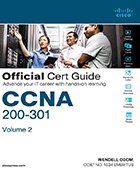A look inside 'CCNA 200-301 Official Cert Guide, Volume 2'
Network security is a crucial skills area for network engineers, and the CCNA 200-301 reflects this. Here's a chapter excerpt on network security from the new guide.
Cisco's updated Cisco Certified Network Associate certification track -- called CCNA 200-301 -- replaces eight separate tracks and shrinks them into one, combining concepts from different areas of networking to create an all-encompassing exam.
The new CCNA 200-301 exam includes traditional networking concepts, as well as new, relevant topics for the current job market, according to Wendell Odom, author of all CCNA Official Cert Guides. His latest guide volumes reflect this change, and both combine traditional topics with original chapters for topics new to CCNA 200-301, including network automation concepts and the importance of network security.
Below is a chapter excerpt from the CCNA 200-301 Official Cert Guide, Volume 2: "Securing Network Devices." This chapter delves into network security terminology and provides readers with an overview of various network security architectures. Odom said the topics in this chapter are completely new for his books and for CCNA 200-301.
Odom described this chapter as a broad brush of network security components, designed to relieve readers of common security misconceptions and to provide a proper understanding of relevant security lingo. Various topics include worms, viruses, denial-of-service attacks and spoofing attacks, as well as what these threats aim to accomplish and how to prevent them.
By the end of the chapter, Odom said, readers should feel prepared for the CCNA 200-301 exam's security section and for the following chapters that dive further into network security best practices. Those subsequent chapters rely on Chapter 5, as this chapter focuses primarily on how to secure networks -- rather than how to secure endpoints -- and provides the context network security beginners need in order to fully grasp the subject.
Network security is hugely important for network engineers, according to Odom, because certain job roles -- primarily in midsize and smaller companies -- require engineers with generalized skills, who then need to know a little about everything in IT roles. The security field is rife with opportunities, he said, and it's an ideal area for those who crave potential for a thriving, long-term career.
Explore CCNA 200-301 Official Cert Guide, Volume 2
Click here to read Chapter 5, "Securing Network Devices."





